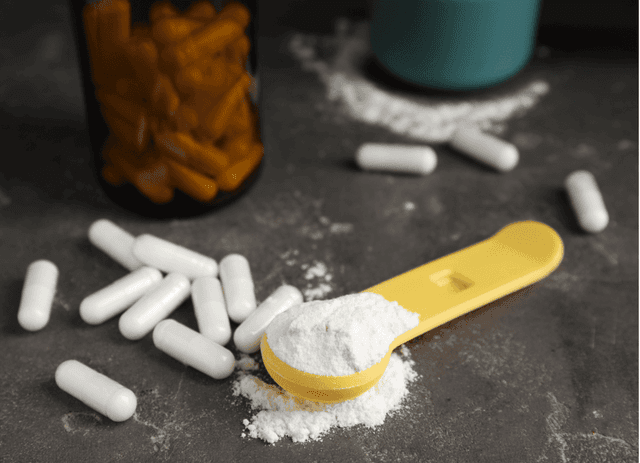Does Creatine Cause Digestive Issues? How to Avoid Bloating and Discomfort with the Best Creatine

March 13, 2024
If you've been hitting the gym and considering supplements to boost your performance, you've probably heard about creatine. But does creatine cause digestive issues? And how can you avoid bloating and discomfort while still reaping its benefits? In this post, we'll dive deep into the relationship between creatine and digestive health, and help you find the best creatine to support your fitness journey without the unwanted side effects.
Understanding Creatine and Digestive Issues
Creatine is one of the most popular supplements among athletes and fitness enthusiasts. It's renowned for enhancing muscle strength, increasing energy levels, and improving exercise performance. However, some users report experiencing digestive issues like bloating, stomach cramps, and diarrhea. So, what's the connection?
Why Do Some People Experience Digestive Discomfort?
Digestive discomfort from creatine can stem from several factors:
- Dosage: Taking too much creatine at once can overwhelm your digestive system.
- Type of Creatine: Not all creatine supplements are created equal; some forms are harder to digest.
- Hydration Levels: Creatine pulls water into your muscles, which can affect digestion if you're not adequately hydrated.
- Individual Sensitivity: Some people naturally have a more sensitive stomach.
Is Creatine Monohydrate the Culprit?
Creatine monohydrate is the most studied and commonly used form of creatine. While it's effective, its powder form can sometimes cause discomfort if not fully dissolved or if taken in large doses. Exploring other options like creatine hydrochloride (HCL) might be beneficial for those with sensitive stomachs.
Debunking Common Myths About Creatine and Digestion
There's a lot of misinformation out there regarding creatine and digestive health. Let's address some common misconceptions.
Myth 1: Creatine Causes Kidney Damage and Severe Gastrointestinal Issues
While early studies raised concerns, extensive research has shown that creatine is safe for healthy individuals when used appropriately. The key is sticking to recommended dosages and ensuring you're using the best creatine suited for your body.
Myth 2: All Forms of Creatine Have the Same Side Effects
As mentioned earlier, different forms of creatine can have varying effects on digestion. Creatine monohydrate might cause bloating for some, while creatine HCL or buffered creatine may be easier on the stomach.
Myth 3: Loading Phases Are Necessary and Cause Discomfort
The traditional approach involves a loading phase with high doses of creatine, which can lead to digestive issues. However, research suggests that a steady, lower dose can be just as effective over time without the side effects.
Interested in learning about dosing strategies? Read our article on how to optimize creatine intake.
Our Top Recommendations

Optimum Nutrition Micronized Creatine Monohydrate Powder
Micronized for easy mixing, supports muscle growth and endurance.
See on Amazon$0.35 per 5g serving

Nutricost Creatine Monohydrate Micronized Powder
Third-party tested, non-GMO, 5g of pure creatine per serving.
See on Amazon$0.2 per 5g serving

NSF Certified, supports muscle power and recovery.
See on Amazon$0.46 per 5g serving

ProMix Creatine Monohydrate Powder
Micronized, additive-free, ideal for performance and recovery.
See on Amazon$0.36 per 5g serving

NOW Foods Sports Nutrition Unflavored
100% pure creatine, GMP certified, boosts strength and endurance.
See on Amazon$0.2 per 5g serving
How to Avoid Bloating and Discomfort: Practical Tips
If you're experiencing digestive issues with creatine, don't give up just yet. Here are some actionable steps to help you enjoy the benefits without the discomfort.
Choose the Best Creatine for You
- Opt for High-Quality Brands: Not all supplements are equal. The best creatine supplements are tested for purity and quality.
- Consider Creatine HCL: This form is more soluble and may be easier on the stomach.
- Look for Micronized Creatine: Smaller particles dissolve better in liquid, reducing the chance of stomach issues.
Adjust Your Dosage
- Skip the Loading Phase: Start with a maintenance dose of 3-5 grams per day.
- Split Your Dose: Take smaller amounts throughout the day instead of all at once.
Pay Attention to Timing and Mixing
- Take with Food: Consuming creatine with a meal can aid digestion.
- Ensure Proper Mixing: Fully dissolve creatine in enough water or juice to prevent undissolved particles from irritating your stomach.
Stay Hydrated
- Drink Plenty of Water: Since creatine affects water distribution in your body, staying hydrated supports both muscle function and digestion.
Monitor Your Body's Response
- Keep a Journal: Note how you feel after taking creatine to identify patterns.
- Consult a Professional: If discomfort persists, speak with a healthcare provider or a nutritionist.
Conclusion: Enjoy the Benefits of the Best Creatine Without the Side Effects
Creatine doesn't have to cause digestive issues. By choosing the best creatine for your needs and following practical tips to minimize discomfort, you can enhance your performance and reach your fitness goals. Remember, everyone's body is different, so it might take some experimentation to find what works best for you.
Ready to make the most of your workouts? Explore our articles and take the first step towards a stronger, healthier you.






